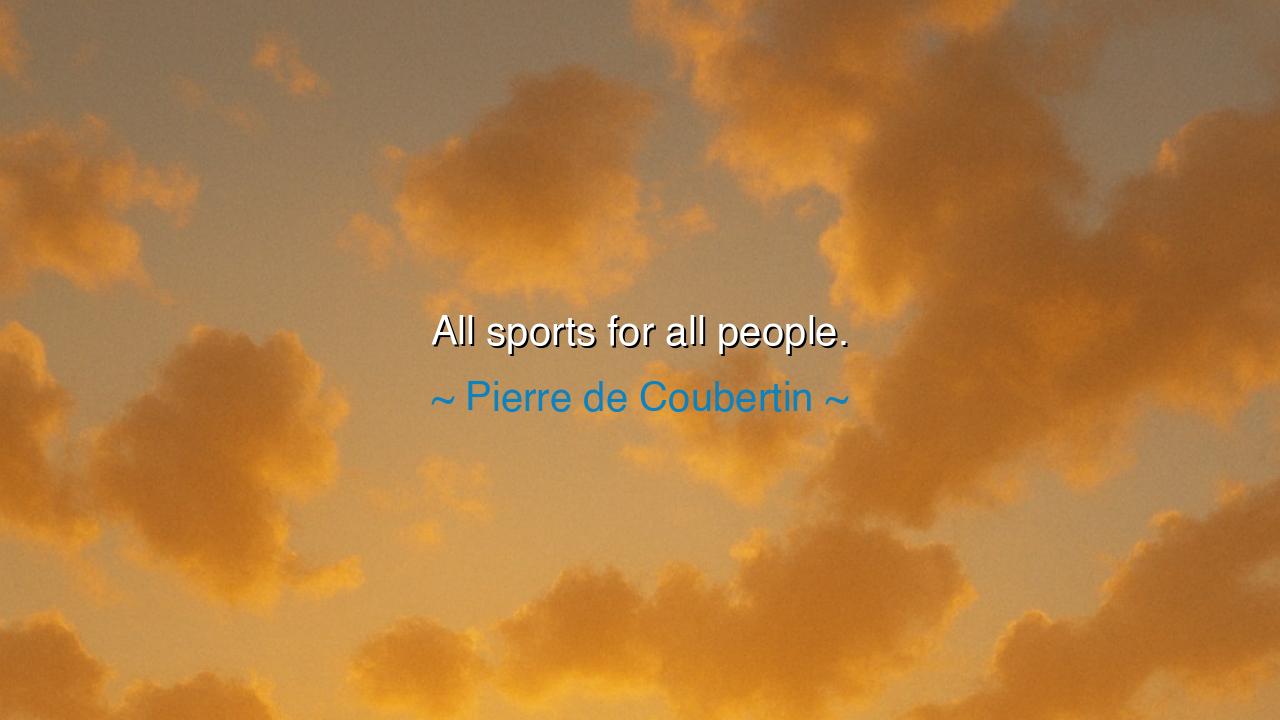
All sports for all people.






Pierre de Coubertin, the visionary who gave new life to the Olympic Games, once declared with timeless simplicity: “All sports for all people.” These words are not mere sentiment; they are the foundation of a philosophy, the proclamation of a new era where the joy of play, the discipline of competition, and the spirit of unity are not reserved for the few, but opened to the many. In this short phrase, Coubertin planted a seed that would grow into a worldwide movement, binding nations together under the banner of shared struggle and shared triumph.
At the heart of this quote is the call for universality. For in ages past, the arena often belonged only to the privileged: the warrior class, the nobles, or those chosen by circumstance of birth. Yet Coubertin looked upon sport as a sacred gift, not the possession of kings, but the inheritance of all humanity. To say “all sports for all people” is to insist that no boundary of wealth, race, or nation should bar the human spirit from the chance to strive, to sweat, to compete, and to grow.
The origin of these words is tied to Coubertin’s dream of reviving the Olympic Games, once held in ancient Greece as a festival of unity. In his time, the late 19th century, the world was fractured by nationalism, inequality, and class division. Yet he saw in sport a weapon against despair, a common language that transcended barriers. Where politics divided, sport could unite; where wealth excluded, sport could invite; where prejudice destroyed, sport could heal. His vision was not small—it was vast, global, eternal.
History offers us a vivid example in the story of Jesse Owens at the 1936 Berlin Olympics. Against the backdrop of a regime preaching racial superiority, Owens, the son of sharecroppers, triumphed with grace and excellence, proving that athletic greatness belongs to no single race or nation. His victories embodied Coubertin’s dream: sports for all people, not just those favored by power or prejudice. In Owens’ leaps and sprints, the whole world saw the truth—humanity’s glory shines brightest when all are given the chance to compete.
Yet Coubertin’s words also carry a deeper teaching: sport is not only for the gifted, the elite, or the professional. It is for the child in the village, the laborer in the city, the elder who still moves with dignity. Sport, in its essence, is life in motion, the body and spirit striving together. To exclude anyone from this is to deny them a part of their humanity. Thus, his quote is not just a vision for the Olympics, but a command for us all: open the field, welcome the stranger, share the game.
The lesson is clear: create spaces where all may play. Do not let wealth, privilege, or exclusivity dictate who may run, who may swim, who may lift their spirit through movement. Encourage the young to try, the weak to grow strong, the shy to find confidence, the overlooked to find recognition. For when sport is shared widely, it becomes not a luxury but a common fire, warming the whole of humanity.
So I say to you: remember Coubertin’s cry, “All sports for all people.” Let it guide your vision of community, of justice, of unity. Build fields where none exist, open doors that others have closed, and cheer not only for the strongest, but for all who strive. For in this way, you will keep alive the ancient fire of Olympia: the belief that through sport, humanity may remember its shared dignity, its shared struggle, and its shared destiny.






AAdministratorAdministrator
Welcome, honored guests. Please leave a comment, we will respond soon